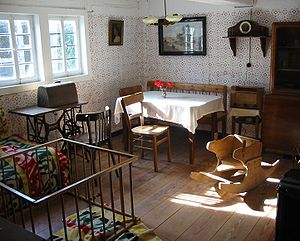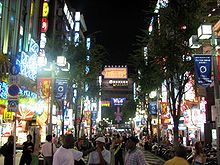- Personal life
-
"Personal Life" redirects here. For The Thermals album, see Personal Life (album).
Personal life is the course of an individual's life, especially when viewed as the sum of personal choices contributing to one's personal identity.[1] It is a common notion in modern existence—although more so in more prosperous parts of the world such as Western Europe and North America.[citation needed] In these areas, there are service industries which are designed to help people improve their personal lives via counselling or life coaching.[2]
Contents
History
In the past, before modern technology largely alleviated the problem of economic scarcity in industrialised countries, most people spent a large portion of their time attempting to provide their basic survival needs, including water, food, and protection from the weather.[3] Survival skills were necessary for the sake of both self and community; food needed to be harvested and shelters needed to be maintained.[4] There was little privacy in a community, and people were identified by their social role.[5] Jobs were assigned out of necessity rather than personal choice.[6]
Furthermore, individuals in many ancient cultures primarily viewed their self-existence under the aspect of a larger social whole, often one with mythological underpinnings which placed the individual in relation to the cosmos.[7] People in such cultures found their identity not through their individual choices—indeed, they may not have been able to conceive a choice which was purely individual. Such individuals, if asked to describe themselves, would speak of the collective of which they were part: the tribe, the Church, the nation.[8] Even now, survival issues are still dominant in many countries and societies. For example, the continents of Africa and Asia are still largely mired in poverty and third-world conditions, without technology, secure shelter, or reliable food sources. In such places, the concepts of a "personal life", "self-actualization", "personal fulfillment", or "privacy" are largely unaffordable luxuries.[9]
The English philosopher, John Locke, was one of the earliest to discuss the concept of individual rights. In the 17th century, he promoted the natural rights of the individual to life, liberty, and property, and included the pursuit of happiness as one of the individual's goals.
Sociology
The notion of a personal life, as now understood, is in part a creation of modern Western society. In the United States, especially, privacy is highly valued. Since the colonial period, Americans have been noted for their individualism and their pursuit of self-definition.[10] Indeed, the United States Declaration of Independence and the Constitution explicitly raise the pursuit of happiness and the expectation of privacy to the level of rights.
In modern times, many people have come to think of their personal lives as separate from their work.[11] Work and recreation are distinct; one is either on the job or not, and the transition is abrupt. Employees have certain hours they are bound to work, and work during recreational time is rare. This may be related to the continuing specialization of jobs and the demand for increased efficiency, both at work and at home. The common phrase "Work hard, play hard" illustrates this mindset. There is a growing trend, however, toward living more holistically and minimizing such rigid distinctions between work and play, in order to achieve the right work–life balance.
The concept of personal life also tends to be associated with the way individuals dress, the food they eat, their schooling and further education as well as their hobbies, leisure activities, and cultural interests. Increasingly, in the developed world, a person's daily life is also influenced by their leisure use of consumer electronics such as televisions, computers and the Internet, mobile phones and digital cameras.[12]
Other factors affecting personal life are an individual's health, personal relationships, pets as well as his home and personal possessions.
Leisure activities
The way in which individuals make use of their spare time also plays an important role in defining their personal lives. In general, leisure activities can be categorised as either passive, in cases when no real effort is required, or active, when substantial physical or mental energy is needed.[13]
Passive activities include watching television, listening to music, watching sports activities or going to the cinema. The individual simply relaxes without any special effort.
Active activities may be more or less intensive ranging from walking, through jogging and cycling to sports such as tennis or football. Playing chess or undertaking creative writing might also be considered as demanding as these require a fair amount of mental effort.
Based on 2007 data, a US survey on use of leisure time found that the daily use of leisure time by individuals over 15 averaged 4.9 hours. Of this, more than half (2.6 hours) was spent on watching TV while only 19 minutes was spent on active participation in sports and exercise.[14]
Privacy
Privacy has been understood as entailing two different concepts; namely informational privacy and decisional privacy. The former concerns the right to be left alone in respect of the most intimate details of one's personal life and is a more accepted doctrine than the latter which concerns freedom from undue regulation and control.[15]
See also
- Avocation
- Personal identity (philosophy)
- Human condition
- Human ecology
- Lifeworld
- Maslow's hierarchy of needs
- Lifestyle (sociology)
- Life stance
- Physical quality-of-life index
- Quality time
- Real life
- Work-life balance
- Personal finance
- Reality
- Simple living
- Henri Lefebvre, philosopher who examined everyday life
- Michel de Certeau, author of The Practice of Everyday Life
References
- ^ Baker, Maureen (2007). Choices and Constraints in Family Life. Oxford University Press. ISBN 9780195421057.
- ^ Williams, Patrick; Davis, Deborah C. (2007). Therapist as life coach: an introduction for counselors and other helping professionals. W. W. Norton & Company. ISBN 9780393705225.
- ^ Van Loon, Hendrik (1921). The Story of Mankind. New York: Boni and Liveright, Inc.. http://etext.virginia.edu/toc/modeng/public/VanStor.html.
- ^ Gupta, Anil K. (10). "Origin of agriculture and domestication of plants and animals linked to early Holocene climate amelioration". Current Science 87 (1). http://www.ias.ac.in/currsci/jul102004/54.pdf.
- ^ Barnard, Alan J. (2004). Hunter-gatherers in history, archaeology and anthropology. Berg Publishers. ISBN 9781859738252.
- ^ "Why did anthropologists get interested in peasants?". Experience Rich Anthropology. University of Kent at Canterbury. http://era.anthropology.ac.uk/Era_Resources/Era/Peasants/intro2.html. Retrieved 26 February 2011.
- ^ Percy, Walker (2000). Lost in the cosmos: the last self-help book. Macmillan. ISBN 9780312253998.
- ^ Ashton-Jones, Evelyn; Charles Lindholm (1991). "Life behind the Veil". The Gender reader. Boston: Allyn and Bacon. pp. 252. ISBN 0205128068.
- ^ Maslow, A. H. (1943). "A Theory of Human Motivation". Psychological Review 50: 370–396. doi:10.1037/h0054346. http://psychclassics.yorku.ca/Maslow/motivation.htm.
- ^ de Tocqueville, Alexis (1840). Democracy in America. London: Saunders and Otley. http://xroads.virginia.edu/~HYPER/DETOC/home.html.
- ^ Best, Shaun (2009). Leisure Studies: Themes and Perspectives. SAGE Publications. pp. 201. ISBN 9781412903868. http://books.google.com/?id=P8Pr8SYBmI8C&pg=PA201&dq=work+leisure#v=onepage&q=work%20leisure&f=false.
- ^ Shah, Agam. "Netbooks Propel Global Semiconductor Sales". PCWorld. PCWorld Communications, Inc.. http://www.pcworld.com/article/173052/netbooks_propel_global_semiconductor_sales.html. Retrieved 26 February 2011.
- ^ Stebbins, Robert A. (November 2002). "Choice and Experiential Definitions of Leisure". LSA Newsletter 63. http://people.ucalgary.ca/~stebbins/reflections1.pdf.
- ^ "Leisure Time on an Average Day". American Time Use Survey. Bureau of Labor Statistics. http://www.bls.gov/tus/charts/leisure.htm. Retrieved 26 February 2011.
- ^ Kumar, Krishna, et al (997). Public and private in thought and practice : perspectives on a grand dichotomy. Chicago; London: The University of Chicago Press. pp. 383. ISBN 0226886247.
Further reading
- The Psychopathology of Everyday Life (1901) – Sigmund Freud
- Critique of Everyday Life (1947) – Henri Lefebvre
- The Revolution of Everyday Life (1967) – Raoul Vaneigem
- The Practice of Everyday Life (1974) – Michel de Certeau
- The Everyday Life Reader, 2001, edited by Ben Highmore. ISBN 041523025X
- English Life and Leisure. A social study., (1952) – Seebohm Rowntree
- Ways of Living: Work, Community and Lifestyle Choice (2009) – Paul Blyton, Betsy Blunsdon, Ken Reed. ISBN 0230202284
- The Sociological Ambition (2001) – Chris Shilling and Philip A Mellor, ISBN 9780761965480
- Thinking About Life A thoughtful
Categories:- Personal life
- Anthropology
- Philosophy of life
Wikimedia Foundation. 2010.




